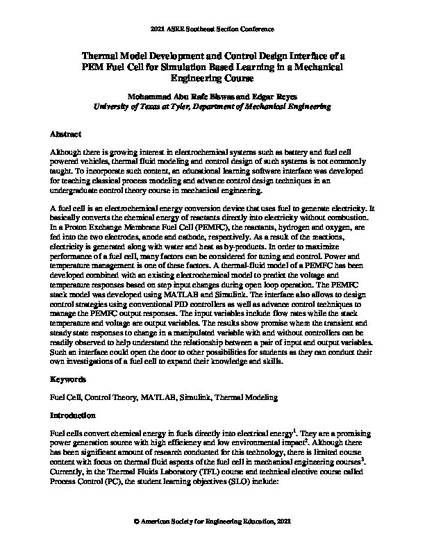
Presentation
Thermal Model Development and Control Design Interface of A Pem Fuel Cell For Simulation Based Learning In A Mechanical Engineering Course
2021 ASEE Southeastern Section Conference
(2021)
Abstract
Although there is growing interest in electrochemical systems such as battery and fuel cell powered vehicles, thermal fluid modeling and control design of such systems is not commonly taught. To incorporate such content, an educational learning software interface was developed for teaching classical process modeling and advance control design techniques in an undergraduate control theory course in mechanical engineering.
A fuel cell is an electrochemical energy conversion device that uses fuel to generate electricity. It basically converts the chemical energy of reactants directly into electricity without combustion. In a Proton Exchange Membrane Fuel Cell (PEMFC), the reactants, hydrogen and oxygen, are fed into the two electrodes, anode and cathode, respectively. As a result of the reactions,electricity is generated along with water and heat as by-products. In order to maximize performance of a fuel cell, many factors can be considered for tuning and control. Power and temperature management is one of these factors. A thermal-fluid model of a PEMFC has been developed combined with an existing electrochemical model to predict the voltage and temperature responses based on step input changes during open loop operation. The PEMFC stack model was developed using MATLAB and Simulink. The interface also allows to design control strategies using conventional PID controllers as well as advance control techniques to mange the PEMFC output responses. The input variables include flow rates while the stack temperature and voltage are output variables. The results show promise where the transient and steady state responses to change in a manipulated variable with and without controllers can be readily observed to help understand the relationship between a pair of input and output variables. Such an interface could open the door to other possibilities for students as they can conduct their own investigations of a fuel cell to expand their knowledge and skills.
Keywords
- Fuel cells,
- Simulated Laboratory,
- Engineering Education
Disciplines
Publication Date
Spring March 9, 2021
Location
Virtual
Citation Information
M. A. Rafe Biswas and Edgar Reyes. "Thermal Model Development and Control Design Interface of A Pem Fuel Cell For Simulation Based Learning In A Mechanical Engineering Course" 2021 ASEE Southeastern Section Conference (2021) Available at: http://works.bepress.com/mohammad-biswas/43/
